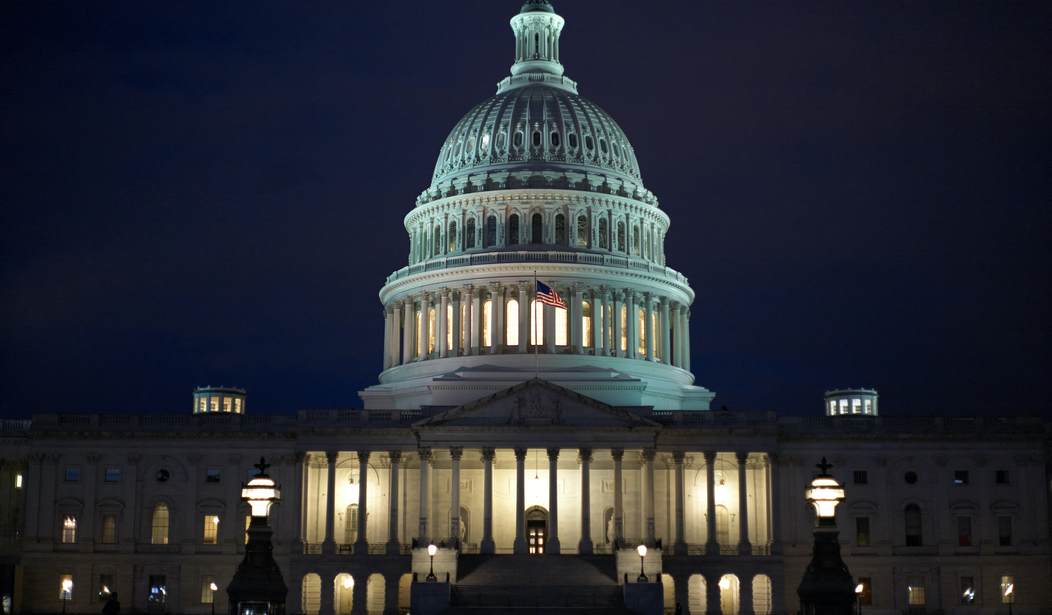As disappointing as 2022 may have been for Senate Republican candidates, there most certainly is hope when it comes to the 2024 map. Even before the November midterm elections, it was being discussed how Democrats were looking particularly vulnerable for the next election to come. Since then, there have been some new developments, like Sen. Kyrsten Sinema of Arizona switching her affiliation from Democrat to independent, and Sen. Debbie Stabenow of Michigan announcing her retirement.
The 2024 map has increasingly found its way into the news cycle. This includes when it comes to specific races, such as the ones above and also about whether Sen. Jon Tester – who is considered a particularly vulnerable Democratic incumbent out of Montana – will run for reelection. It also includes more analysis on the overall map.
On Sunday's edition of "Meet the Press," host Chuck Todd reminded how "Democrats are facing a daunting Senate map in 2024, having to defend 23 seats," which he pointed out is "nearly half of the entire conference" and that Democrats "only have 51 seats."
Todd went on to point the picture for next year, saying, "Compare that to just 11 for Senate Republicans, Democrats are already bracing for challenges to incumbents in some Republican-leaning states like West Virginia, Montana and Ohio."
As he was about to welcome Sen. Stabenow on, who, while still defending President Joe Biden, also acknowledged how he's handled classified documents is "certainly embarrassing," Todd brought up her retirement. "And now Michigan Democratic Senator Debbie Stabenow has become the first Democrat on that side of the aisle announcing she will not seek reelection," Todd said by way of introduction. "It sets the stage for another very competitive race. And perhaps one of the most important battleground states in not just the presidential race, but in every race that we deal with."
Recommended
In addition to talking about classified documents, Stabenow and Todd discussed the forecast for the Senate in 2024, during which the retiring senator continued to sing the praises of the Biden administration as she had been doing throughout the segment. She also claimed she was "confident" about Democrats holding onto the majority in 2024.
"I imagine we'll be talking over the next two years and we'll see if your optimism holds," Todd offered to end the segment.
Discussion of the map also made its way to a blog post for "Meet the Press" the week before, "Senate races could complicate battle for House in 2024." It was tweeted out again more recently, on Monday afternoon.
Senate races could complicate the battle for House in 2024.
— Meet the Press (@MeetThePress) January 16, 2023
Any competitive seat where a lawmaker is seeking higher office deprives Democrats of the advantages incumbents typically bring to their races. https://t.co/4Q1Dla7Buf
When it comes to who will run to replace Stabenow, Democratic Rep. Elissa Slotkin has been floated as a potential candidate. She just won reelection in Michigan's 7th Congressional District last November with 51.73 percent of the vote to Republican opponent's Tom Barrett's 46.32 percent.
Rep. Katie Porter (D-CA) also recently announced she is running against Sen. Dianne Feinstein (D-CA), though the 89-year-old incumbent has not yet announced her retirement and may still run for reelection. Porter's race in California's 47th Congressional District was even tighter, as she won reelection by 51.72 percent of the vote to Republican opponent Scott Baugh's 48.28 percent.
As the blog post from Bridget Bowman mentions:
Michigan Rep. Elissa Slotkin is also weighing a run for her state’s open Senate seat. She told MSNBC on Tuesday that she is “seriously considering” a run but does not have a timeline for making her decision.
But if Slotkin does run, that would also open up another competitive seat. Michigan’s 7th District was the most expensive House race in 2022, with more than $30 million spent on ads, per the ad tracking firm AdImpact. Slotkin won a third term by 5 points, outrunning Biden, who would have won the district by half a percentage point.
Bowman also later writes, "Senate races could also complicate Republicans’ path to holding onto their slim majority," such as if Rep. Ryan Zinke (R-MT) runs for the Montana Senate seat, whether that be against Tester or if it's an open seat.
Other media coverage has taken on an even more favorable stance toward Republicans, though. As optimistic as Stabenow may be, and while Bowman may warn about the Republican House majority, The Hill on Monday morning highlighted, "The eight Senate seats most likely to flip in 2024." Such a piece is highly significant, as each of those eight seats mentioned favors Republicans. The piece, by Max Greenwood, was also showcased by RealClearPolitics for that same day.
Those "likely" flips come out of Arizona, Michigan, Montana, Nevada, Ohio, Pennsylvania, West Virginia, and Wisconsin.
Arizona may be somewhat more complex, as it's mentioned because of how Sinema running as an independent, potentially against potential Democratic rival Rep. Ruben Gallego, could split the vote. Gallego has been hinting he would run to replace Sinema, both when she was still a Democrat, and now that she's an independent.
"Of course, Arizona Republicans have their own set of challenges to deal with. The party is at odds over its direction, especially after a disappointing 2022 midterm election cycle. And one of their strongest potential recruits, former Gov. Doug Ducey, has said that he’s not considering a Senate bid," Greenwood adds.
The races in question only get better for Republicans from there.
Next is Michigan, where that race "is emerging as one of the most contentious in the country."
It was once considered "promising" for Democrats, that is until Stabenow's announcement "scrambled the party’s calculus in the race and handed Republicans a prime opportunity to go after an open Democratic seat." Greenwood also adds, "The uncertainty stemming from Stabenow’s coming retirement sets the stage for a potentially long and competitive Democratic primary that could complicate the party’s hopes of holding the seat next year."
Next is Montana, where former President Donald Trump won in 2020 by over 16 points and in 2016 by over 20 points. Tester won reelection in 2018 by just 3.5 points against now Rep. Matt Rosendale. Also noteworthy is that he had the benefit of running in the midterm elections 2018, which provided something of a blue wave for Democrats.
That race, Greenwood believes, would become even more dire for Democrats, should Tester not run for reelection.
Also included is Nevada, which again this time includes a vulnerable Democratic incumbent, Sen. Jacky Rosen, on the ballot. Nevada was perhaps the biggest disappointment of the 2022 Senate races, as Sen. Catherine Cortez Masto was absolutely vulnerable and absolutely beatable, and should have been sent packing to be replaced by Republican Adam Laxalt. She wasn't, though, and held onto her seat with her earning less than 1 point more than Laxalt.
There could still be a chance, though, when it comes to defeating Rosen. "Things aren’t expected to be much easier for" her, Greenwood mentions, before going on to write, "It’ll also be Rosen’s first reelection bid, and the political environment next year is expected to be very different from the one she ran in during her 2018 campaign, when she ousted former Sen. Dean Heller (R)."
Next on the list is Sen. Sherrod Brown, a Democratic incumbent out of Ohio. The state has certainly trended increasingly red, especially with Trump's influence. Unlike Tester, Brown won reelection in 2018 more handily, by nearly 7 points. "Still, Republicans are expected to contest the seat fiercely next year," Greenwood mentions, adding how an unpopular Biden – assuming he runs again – will also be on the ballot.
Democrats actually picked up a seat in Pennsylvania, with former Sen. Pat Toomey, a retiring Republican, being replaced by Sen. John Fetterman, a Democrat. That doesn't mean that 2022 needs to be a repeat of 2024, though, whether Democratic Sen. Bob Casey Jr. runs for reelection or its another open seat.
As Greenwood mentions, "2024 will bring new challenges. While Fetterman won his race last year, Democrats and many Republicans say that Oz was a particularly weak candidate. There’s also the fact that Sen. Bob Casey (D-Pa.) was recently diagnosed with prostate cancer, raising questions about what it might mean for his 2024 reelection bid."
Also on the list is West Virginia, where Republicans again look to unseat Democratic Sen. Joe Manchin. While he's something of a conservative or at least moderate Democrat, he's had some disappointments, such as going ahead with the misnamed so-called "Inflation Reduction Act" as part of a deal that ultimately didn't even pan out in his favor.
Manchin is also considered incredibly unpopular in the state, which is considered among the most Republican in the country, and where Biden has faced his lowest approval ratings. Trump won the state in 2016 by over 42 points and in 2020 by over 39 points.
If Manchin, who won reelection by just over 3 points in 2018, doesn't run again, that's it. "What’s more, many Democrats believe that Manchin is perhaps the only Senate candidate who can beat a Republican in West Virginia, and he hasn’t yet committed to running for another term. If he decides to retire from the Senate, it would almost certainly take the seat out of play for Democrats," Greenwood notes.
Last on the list is Wisconsin, which Greenwood described as "one of the closest-watched Senate contests in 2024," even if Democratic incumbent Sen. Tammy Baldwin does run for reelection. This is especially as it "remains a crucial battleground state with a propensity to swing wildly from one election to another."
And when it comes to Democratic targets? Greenwood mentions that the reality of there being "few opportunities for Democrats to go on the offensive" and how "their best targets appear to be Florida and Texas, but both states have proved elusive for Democrats in recent years."
Yeah, good luck with those seats.

























